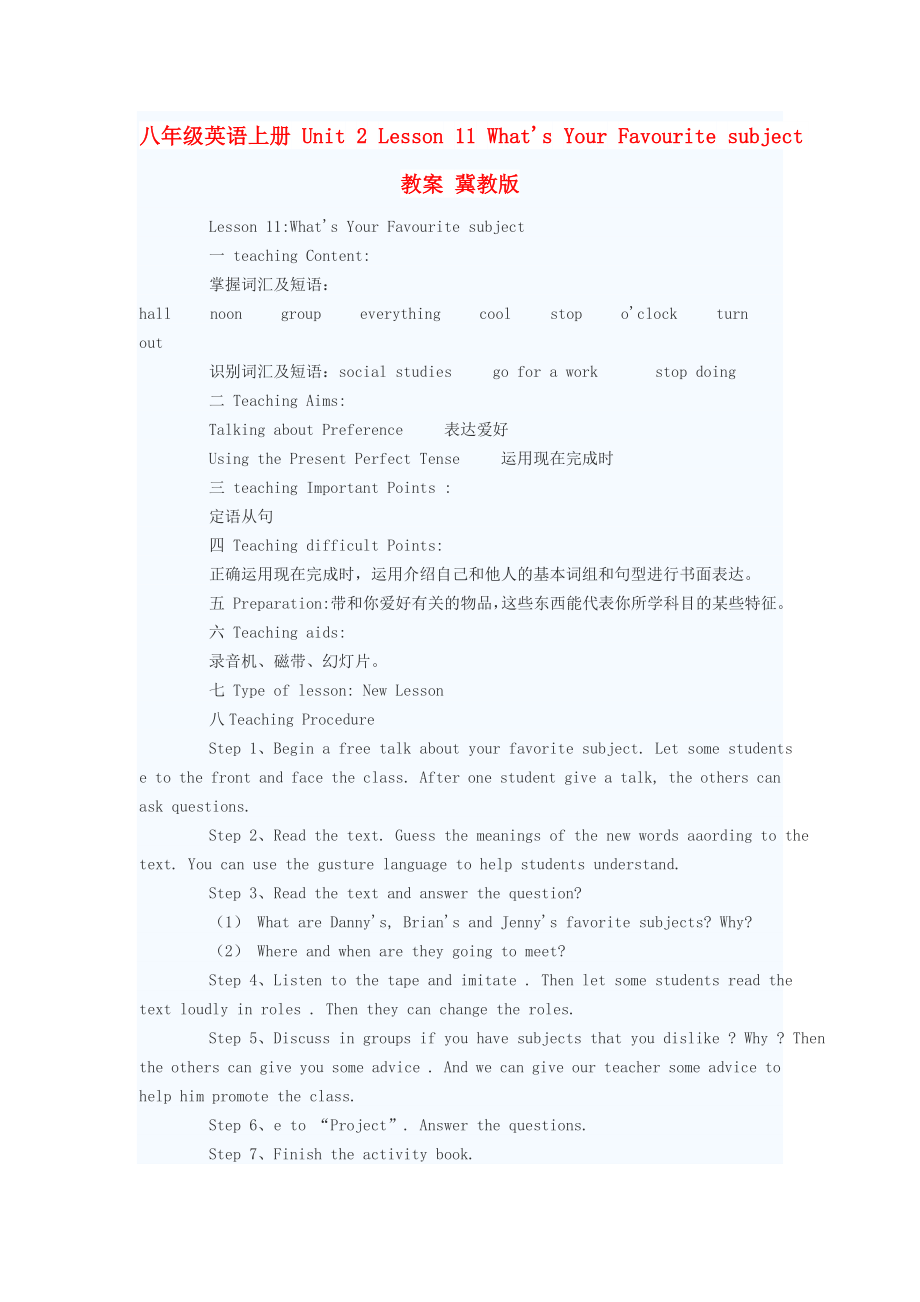《八年級(jí)英語上冊(cè) Unit 2 Lesson 11 What's Your Favourite subject教案 冀教版》由會(huì)員分享����,可在線閱讀��,更多相關(guān)《八年級(jí)英語上冊(cè) Unit 2 Lesson 11 What's Your Favourite subject教案 冀教版(2頁珍藏版)》請(qǐng)?jiān)谘b配圖網(wǎng)上搜索����。
1���、八年級(jí)英語上冊(cè) Unit 2 Lesson 11 What's Your Favourite subject教案 冀教版
Lesson 11:What's Your Favourite subject
一 teaching Content:
掌握詞匯及短語:hall?? noon?? group?? everything?? cool?? stop?? o'clock?? turn?? out
識(shí)別詞匯及短語:social studies?? go for a work??? stop doing
二 Teaching Aims:
Talking about
2���、 Preference?? 表達(dá)愛好
Using the Present Perfect Tense?? 運(yùn)用現(xiàn)在完成時(shí)
三 teaching Important Points :
定語從句
四 Teaching difficult Points:
正確運(yùn)用現(xiàn)在完成時(shí)���,運(yùn)用介紹自己和他人的基本詞組和句型進(jìn)行書面表達(dá)����。
五 Preparation:帶和你愛好有關(guān)的物品���,這些東西能代表你所學(xué)科目的某些特征���。
六 Teaching aids:
錄音機(jī)、磁帶��、幻燈片�。
七 Type of lesson: New Lesson
八Teachin
3�����、g Procedure
Step 1��、Begin a free talk about your favorite subject. Let some students e to the front and face the class. After one student give a talk, the others can ask questions.
Step 2�����、Read the text. Guess the meanings of the new words aaording to the text. You can use the gusture language t
4��、o help students understand.
Step 3��、Read the text and answer the question?
?���。?) What are Danny's, Brian's and Jenny's favorite subjects? Why?
?�。?) Where and when are they going to meet?
Step 4�、Listen to the tape and imitate . Then let some students read the text loudly in roles . Then they
5、can change the roles.
Step 5���、Discuss in groups if you have subjects that you dislike ? Why ? Then the others can give you some advice . And we can give our teacher some advice to help him promote the class.
Step 6��、e to “Project”. Answer the questions.
Step 7�����、Finish the activity book.
Sum
6��、mary:
1����、 讓學(xué)生課前準(zhǔn)備能代表各學(xué)科的物品非常重要,它有利于激活課堂氛圍�,開發(fā)學(xué)生的創(chuàng)造力。
2����、 在小組討論時(shí)�,鼓勵(lì)“學(xué)困生”大膽發(fā)言。記住他的點(diǎn)滴進(jìn)步�����。讓他從內(nèi)心深處發(fā)生“值的”變化�����。體會(huì)到這一學(xué)科的誘惑力�����。
講解:
1、 For our project. We will play basketball.
球類前不加the. 樂器前必須加:play the piano? “彈鋼琴”???? play the violin?? “拉小提琴”�。
The boy often plays the piano on Sundays.
2、It wou
7�、ld be fun to study about China.
“It +系動(dòng)詞+帶to的不定式”結(jié)構(gòu)中,It是形式主語���,真正的主語是帶to的不定式�����。
It is easy to learn English.
3���、I liked drawing when I was a little boy.? 當(dāng)我是個(gè)小男孩的時(shí)候,我喜歡畫畫�����。??? “when,before,after”引導(dǎo)的時(shí)間狀語從句����,遵從主從一改原則。主句用過去時(shí)����,從句也用相 應(yīng)的過去時(shí)�。
Before I went to work, I drank another cup of tea???? 在我上班之前
8�、,我又喝了一杯茶����。
4、Turn out the light.? 熄滅燈
Turn on是turn out的反義詞��,也可以說成turn off.指開關(guān)電器一類的東西�,同時(shí)turn up表示“開大點(diǎn)”,turn down表示“擰小點(diǎn)”���。
5����、We should stop talking.? 我們應(yīng)該停止談話�����。
“should” 情態(tài)動(dòng)詞“應(yīng)該”��,后接動(dòng)詞原形��。They? should go there on time.?? 他們應(yīng)該按時(shí)去那��。
Stop to do 停下來去做某事��。?? Stop doing 停止做某事�。
We stop to eat some
9、 bread. 我們停下來去吃面包�����。
6�、關(guān)于定語從句
Find some classmates who like the same subject.找到喜歡同一科的一些同學(xué)。Who like the same subject 作定語�,修飾classmates,是定語從句�。
Here are some things you can do. 這是你能做的一些事。 That 在定語從句中做do賓語時(shí)可以省略�。
Take about jobs that use math. that use math作jobs的定語從句,that在賓語從句中作主語時(shí)��,不能省略���。
Show some of the things you have made in your art class.展示在你的美術(shù)課上做的一些東西���。You have made in your art class做things的定語從句�����,that在定語從句�。
 八年級(jí)英語上冊(cè) Unit 2 Lesson 11 What's Your Favourite subject教案 冀教版
八年級(jí)英語上冊(cè) Unit 2 Lesson 11 What's Your Favourite subject教案 冀教版

